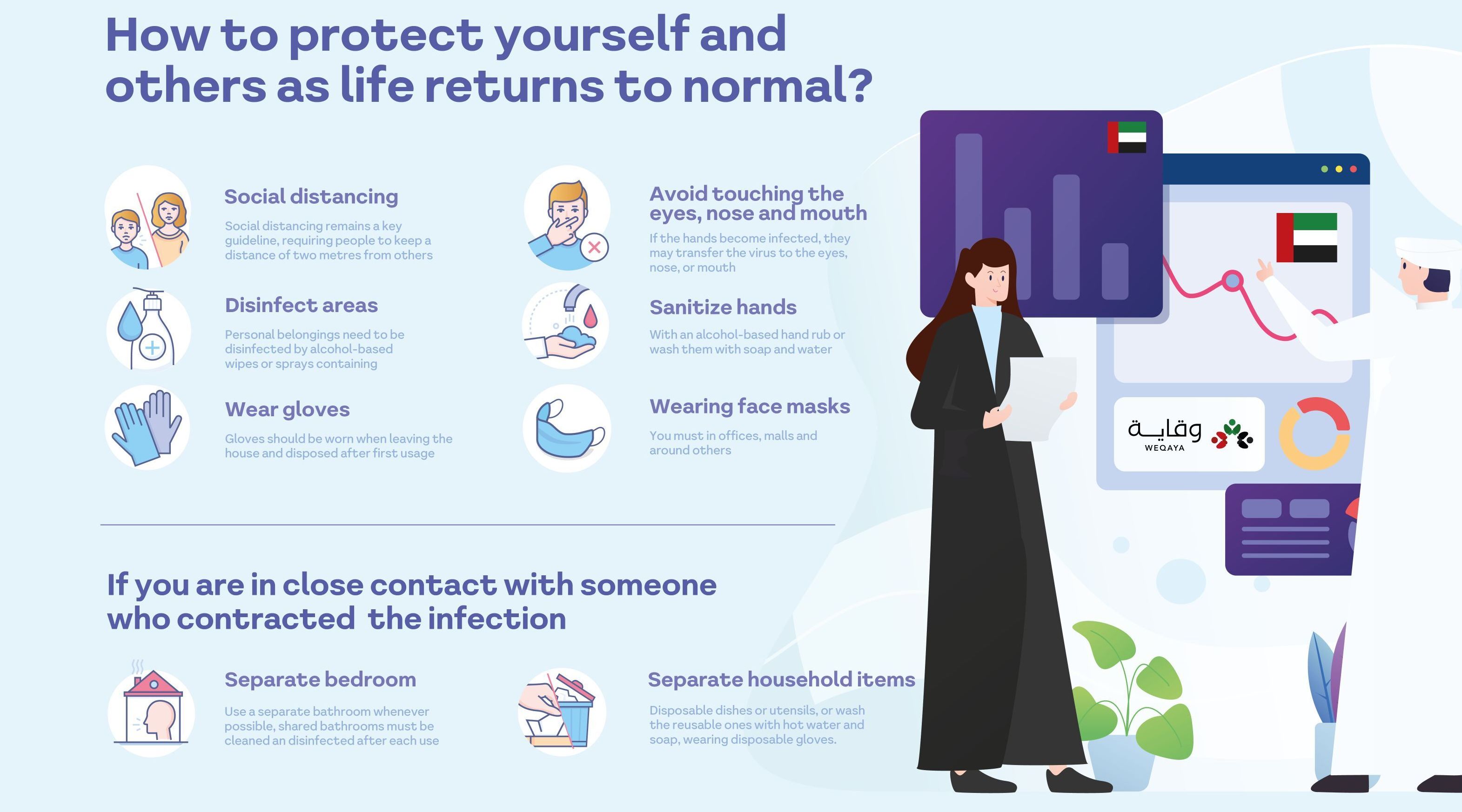How to protect yourself and others as life returns to normal?
With many countries around the world starting to ease restrictions imposed due to the spread of COVID-19, the UAE is taking steps to reinstate several aspects of work and life, while ensuring precautionary measures are being implemented.
This gradual return to "normal" means people will have to get ready to safely interact with the world – at work, malls, public facilities and everywhere in order to ensure containment of the virus and health and safety for everyone.
As the UAE witnesses a relative moderation in the number of COVID-19 cases, along with higher numbers of recoveries, employees in the public and private sector are returning to work in stages, ensuring the continuity of services during a stage that requires "living with the pandemic", which places more emphasis on personal awareness and responsibility.
In Dubai, movement is now allowed between 4:30 a.m. and 11:00 p.m., with some public beaches and parks already open, as well as gyms, entertainment facilities, malls and cinemas. There are still restrictions on the movement of the children and elderly in some areas, which need to be observed closely to protect the health of vulnerable segments.
Schools and universities will remain closed to pupils and students and run e-learning programmes until September at least.
Abu Dhabi, movement restrictions are imposed from 10:00 p.m. until 6:00 a.m. While restaurants, cafes and malls have re-opened with restrictions on capacity, other facilities such as hotels and resorts are preparing to open upon receiving authorities' approval.
To protect yourself and everyone around you, preventive measures must be observed at all times, while adhering to the government restrictions as regularly updated. Social distancing remains a key guideline, requiring people to keep a distance of two metres from others at all times outside homes to prevent possible infections.
Wearing face masks is also a must in offices, malls and around others, with some restrictions being eased in this regard. People are not required to wear face masks while driving their own cars alone or with family members.
Work requires interaction with others and with objects. With companies, restaurants and virtually all places required to disinfect regularly, electronic devices, such as keyboards, computer accessories, tablets, screens and phones need to be disinfected by alcohol-based wipes or sprays containing at least 70% alcohol. This may require fitting them with wipeable covers to prevent any damage.
Experts worldwide agree that washing hands is the best practice to prevent from catching COVID-19 and other viruses. Regularly and thoroughly clean your hands with an alcohol-based hand rub or wash them with soap and water kills viruses that may be on your hands. WHO experts explain that washing hands can keep you healthy and prevent the spread of respiratory and diarrheal infections from one person to the next.
Washing your hands is easy, and it’s one of the most effective ways to prevent the spread of germs. Clean hands can stop germs from spreading from one person to another and throughout an entire community—from your home and workplace to childcare facilities and hospitals.
If soap and water are not readily available around you, WHO affirms that you can use an alcohol-based hand sanitizer that contains at least 60% alcohol. You can tell if the sanitizer contains at least 60% alcohol by looking at the product label.
If you are in close contact with someone who contracted the infection, you need to follow a few additional steps. The sick person must remain in a separate bedroom and use a separate bathroom whenever possible. Shared bathrooms must be cleaned an disinfected after each use, and preferably by the patient if possible.
If you are living with someone who tested positive, make sure the patient eats in their own room whenever possible. Use disposable dishes or utensils, or wash the reusable ones with hot water and soap, wearing disposable gloves. Make sure to dispose of garbage bags safely and to wash your hands very well afterwards.
Statistics indicating the number of COVID-19 tests conducted per 1 million people in each country have shown that the UAE is conducting a robust testing program – as essential tool to effectively combat the pandemic. Figures show that the UAE conducted a massive number of 210,000 tests per one million people as of May 26th.
This level of screening, along with taking preventive precautions and measures on a personal and public level, will ensure the health and safety of the public in the ongoing fight against COVID-19.
 AR
AR UR
UR
